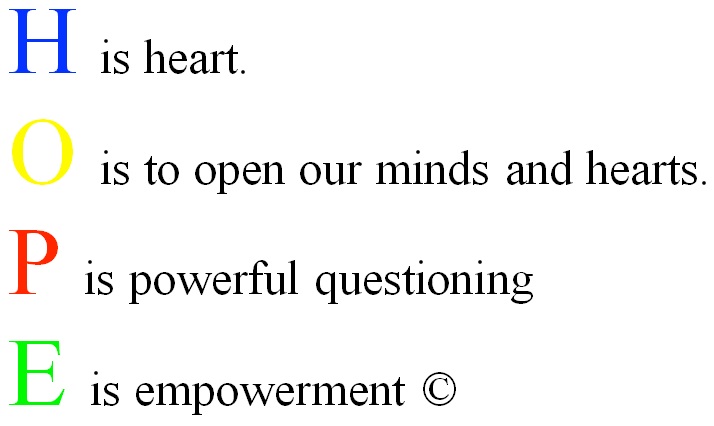A Coaching Model Created by Yin Leng Choy
(Career and Life Coach, SINGAPORE)

“Hope”, Beethoven cried, “you forge the heart into steel”. Hope is confidence. Hope is determination. Hope is courage. And faith is the ultimate expression of hope. Belief fortifies the heart.
When we can gain the trust of our clients and start the coaching journey with them, we are imparting HOPE to them. We can enable them to see the light at the end of the dark tunnel through a series of coaching conversations and aroused in them the courage and the determination to move forward in the direction which they desired. Even in the darkest of night, they believe the sun will shine behind the dark clouds, with HOPE.
HOPE is my coaching model. Why HOPE? When one loses all hopes, one loses faith, courage, and the will to move on. The path ahead would be dark and full of uncertainties. Even a step forward seems impossible.
It was said that we can live for three weeks without food, three days without water, and, yes, we can even live three minutes without air, but we cannot live without hope.”
Dr. Norman Cousins said, “It is not the physical death that is frightening. More devastating is the living dead.” By living death, he means though one is physically alive, one has lost the meaning and the essence of living. This is especially so if one loses HOPE
Dr. Daisaku Ikeda, a prolific poet, and writer said, “Hope is life! Despair is death! To challenge is to win! To give up is to lose!”
Hence, HOPE is the very essence of living. HOPE is the path moving forward and coaching is about how the coach can move the client forward by a series of conversations.
When the client came to a coach, many times it is because s/he is stuck. S/he cannot move forward. The path ahead for them is embedded amid uncertainties. They feel helpless and hopeless. It is the coach which partners with them to journey and explore the whole world of possibilities and rekindle the hope in them that they have all the power within them to make changes, to be accountable for the results they wanted to see in themselves.
The journey of coaching is a path that leads to self-awareness and realization to make changes or to reframe perspectives to create the desired outcome for the client what to see.
The HOPE Model:
His hearts and the hearts of our clients.
Our hearts: We must have the heart to empathize with our clients and the heart to listen to our clients attentively with no judgment whatsoever. This is our Coaching Presence. We need to be in the moment with our client to notice any shift in energy level and the spoken and unspoken words from the client. We must not only physically but mentally be present with our clients to understand them better. Our hearts must not only be able to resonate with theirs but must be able to lift their hearts.
Clients’ Hearts: Coaching with the hearts of the clients also means that we are prepared to walk away from the coaching relationship if this is in the best interest of the client. Clients need to trust that the coach’s primary motivation is a desire for them to reach their full potential. What is best for our clients, is the heart of the coach’s priority.
Heart of the issue: This can be made equivalent to our session goal or the coaching agreement. A session without a goal is like an arrow aiming to nowhere. It is the mission of the coach to identify and reconfirm what the client wants to achieve and what is meaningful and important for the client to be able to achieve that. As coaches, we continue the conversation in the direction of the client’s desired outcome unless the client indicates otherwise. Hence, understanding the Heart of the issue is very important.
O is open.
One of the main requirements for creating a trusting space is an open mind and a non- judgemental attitude on the part of the coach. It is often said that the coach determines the process but the client determines the content of the sessions. The client always sets the coaching agenda.
By setting their agenda, we open their hearts to whole new possibilities and opportunities for their circumstances. In addition to that, we as coaches must also adopt an open attitude to listen to them with ‘open’ minds that are free from judgment. Our minds must be like a white canvas, totally blank. It will only be filled with paints and colors of the clients.
The aim of coaching is for the client to be their best self, and it is up to them to decide what this better self looks like. It is up to us to listen to and validate their desire for a better self, even if it is not what we would want in our own lives, or have thought of as the best thing for them.
His powerful questioning.
Questions have the power to change lives. They can jump-start creativity, change our perspective, empower us to believe in ourselves, push us to think things through, or call us to action.
Why ask questions, anyway? What’s the benefit of using coaching questions? Quite simply, questions hold the power to cause us to think, create answers we believe in, and motivate us to act on our ideas. Asking moves us beyond passive acceptance of what others say, or staying stuck in present circumstances, to aggressively applying our creative ability to the problem.
Questions also redefine relationships between people. When I am advising, mentoring, or consulting, I’m the expert. My role makes me your superior (at least in knowledge). But when I’m asking you for your ideas, I’m a peer. Questions honor you as a person and communicate your value as an equal. And because this asking approach changes the relationship, it also changes you.
The coaching approach forces your conversations to become less about your thoughts, your input, and how you can steer the dialogue around to the answer you think will work. You start Listening. When you listen to another person, you decrease what you say, so that others can increase. And that’s where the magic happens: the more you listen, the more you see how capable they are, how much they can do with a little encouragement, and what wonderful individuals they are. The more you ask, the more you love.
Simply asking, “What could you do about that?” moves people away from depending on you for answers, and toward taking leadership in the situation. Asking builds the responsibility muscle, and that develops leaders. By powerful questions I mean they are questions that can trigger a spark in the client to make them exclaimed with delight, “Ah-ha!”. They will be more committed to actions derived from their solutions.
E is the empowerment.
When they move from a dependent model to a self-reliant mode via the coaching conversations, we are empowering them to make their own decisions and actions to move towards their desired goal or direction. They begin to see light in the dark tunnel, to seek their rainbow and reach their dreams.
If we can ignite the spark in their lives, courage and hope will be born and no obstacle is a hindrance for them to pursue their dreams.
They become their driving force to see the desired change they wanted to see. After all, it’s their decisions, their choices so they would more readily want to put what they set out to achieve into action. They are empowered and would be responsible to pursue their action plans towards achieving their goals.
With empowerment, they can transform it into confidence. With each step they take, the word is strong, the impact stronger and the confidence growing all the time. The clients would do it because they wanted to and not because they were told to. This gives a lot of strength and power to them to move forward.
Conclusion
The HOPE model aims at opening up people’s minds to discover the huge innate potential within them and empowering them to see a different perspective while exploring possible alternatives to their best possible solutions. In the process, empowering them with hope to clear the ‘clouds’ in their lives so that the ‘sun’ within them can shine once again.
Once the hope in the life of an individual is ignited, possibilities will open and opportunities created. The coaching journey utilizing the HOPE model will open up the minds and hearts of the clients empowering them to a journey of self-realization and discovery.
Last but not least, I would like to quote what Dr. Daisaku Ikeda said, ‘As long as one has hope, there is nothing one cannot achieve, everything is born from hope.’
